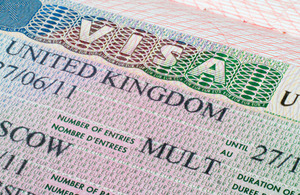Includes changes to immigration bail, electronic entry clearance, Tiers 1, 2 and 4
The Minister of State for Immigration, Brandon Lewis, has today announced a new Statement of Changes in Immigration Rules.
 Image credit: UK GovernmentYou can read the 75-pages Statement of Changes (HC 309) here.
Image credit: UK GovernmentYou can read the 75-pages Statement of Changes (HC 309) here.
The explanatory memorandum is published separately here and it says the purpose of the main changes is to:
- Take account of the future commencement of the immigration bail provisions in Schedule 10 to the Immigration Act 2016.
- Provide for entry clearance to be issued electronically.
- Allow standard and marriage/civil partnership visit visa holders to transit using the same visa.
- Clarify and remove inconsistencies from the rules relating to indefinite leave to remain for main applicants and their dependants in work categories.
- Double the number of available places in the Tier 1 (Exceptional Talent) category to 2,000, and allow accelerated settlement for certain applicants.
- Consolidate and clarify the rules for Tier 1 (Entrepreneur) applicants.
- Make new Tier 2 provisions for research positions and for students switching from Tier 4.
In a written statement to the Commons, Brandon Lewis explained the changes as follows:
"My rt hon Friend the Home Secretary is today laying before the House a Statement of Changes in Immigration Rules, copies of which will be available in the Vote Office.
The offer the UK makes to highly-skilled international leaders in science, research digital technology and the arts is being enhanced by doubling the number of Tier 1 (Exceptional talent) places to 2000 visas per year.
As announced in the Autumn Budget, and to support our ambitions on innovation and research and development, the changes also include provisions to enable internationally recognised global leaders in science, as well as those in digital technology, and the arts and creative sectors, endorsed under the Tier 1 (Exceptional talent) route, to apply for settlement after 3 years, amend Tier 2 rules to allow for faster switching for Tier 4 students below PhD level, while also making it easier to employ international researchers and members of established research teams by relaxing the labour market test under Tier 2. The changes also provide for additional flexibility within our settlement rules to enable scientists and researchers who are called to assist with humanitarian and environmental crises to be absent from the UK for more than 180 days, if required.
The changes make other amendments to the settlement rules for work routes, for consistency. These relate to the 180-day absence provision, breaks in employment, time spent in the Crown Dependencies, and the calculation of the qualifying period.
The rules for entrepreneurs are being simplified following customer feedback, to make them clearer and easier to follow (the requirements themselves are largely unchanged).
We continue to improve and modernise the UK's border and immigration system, which will now include moves toward further digitisation. These changes are required to facilitate the planned move toward introducing immigration permissions issued in electronic form. This will also allow trials to be undertaken that will test the operation of any new system. The rules are also being changed to permit holders of standard visit visas to transit the UK rather than having to get a different type of visa. This builds on the work, begun in April 2015, to simplify the Immigration Rules for visitors."